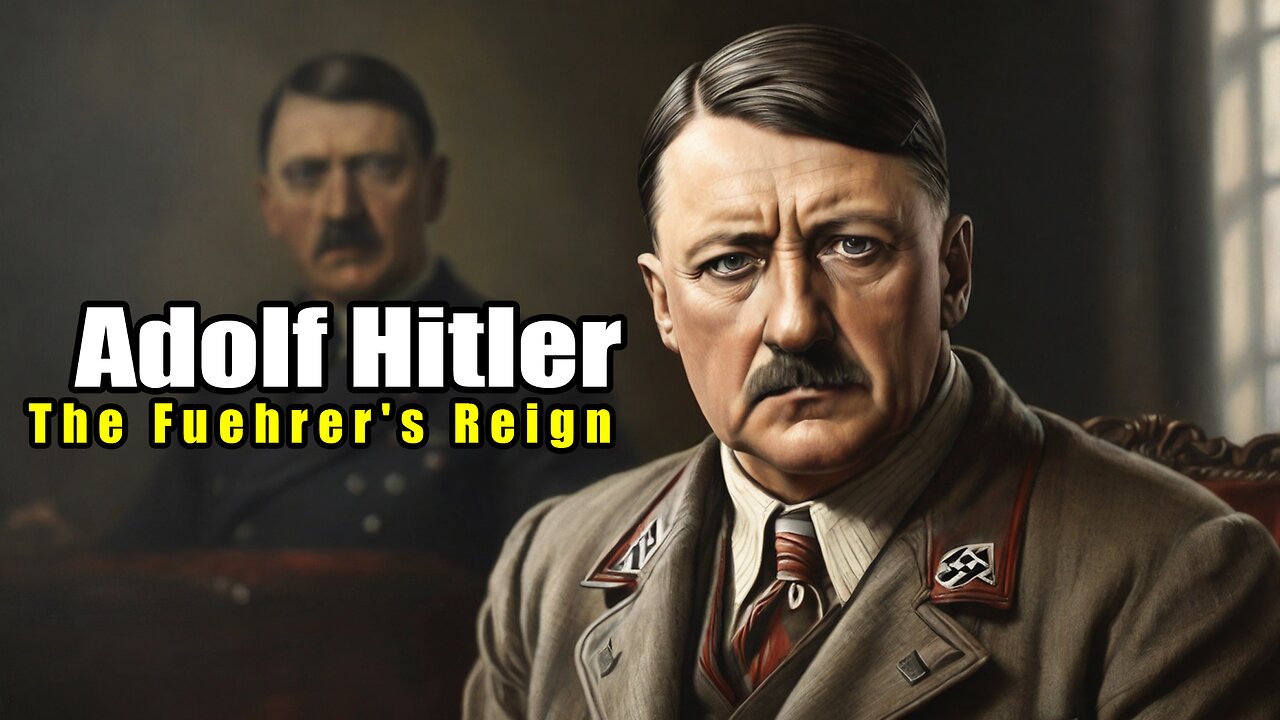Premium Only Content

Adolf Hitler - The Fuehrer's Reign (1889 - 1945)
Adolf Hitler (1889-1945) was a German politician and dictator who played a central role in the rise of Nazi Germany and the initiation of World War II. Here is an overview of key aspects of Hitler's life and historical impact:
Early Life and Background:
Birth:
Adolf Hitler was born on April 20, 1889, in Braunau am Inn, Austria-Hungary (now Austria).
Artistic Aspirations:
Hitler initially aspired to be an artist and applied to the Vienna Academy of Fine Arts, but he was rejected twice.
Rise to Power:
Entry into Politics:
Hitler moved to Munich, Germany, in 1913. He joined the German Workers' Party (DAP), which later became the National Socialist German Workers' Party (NSDAP or Nazi Party).
Beer Hall Putsch:
In 1923, Hitler attempted to overthrow the Weimar government in what became known as the Beer Hall Putsch. The coup failed, and Hitler was imprisoned.
Mein Kampf:
While in prison, Hitler wrote "Mein Kampf" (My Struggle), outlining his political ideology and anti-Semitic beliefs.
Rebuilding the Nazi Party:
After his release, Hitler focused on rebuilding the Nazi Party. The economic hardships of the Weimar Republic contributed to the party's appeal.
Dictatorship and Policies:
Appointment as Chancellor:
Hitler became Chancellor of Germany on January 30, 1933, following a series of political maneuvers.
Enabling Act:
The Reichstag Fire in 1933 led to the passage of the Enabling Act, granting Hitler dictatorial powers. This marked the beginning of the erosion of democratic institutions in Germany.
Persecution and Anti-Semitism:
Hitler implemented anti-Semitic laws, leading to the persecution and marginalization of Jews. The Nuremberg Laws in 1935 stripped Jews of their German citizenship and prohibited intermarriage.
Expansionist Policies:
Hitler pursued an aggressive foreign policy, reoccupying the Rhineland in 1936 and annexing Austria (Anschluss) in 1938.
World War II:
Invasion of Poland:
Hitler's invasion of Poland in 1939 triggered the start of World War II.
Blitzkrieg Tactics:
German forces, employing blitzkrieg tactics, swiftly conquered several European countries, including France, Belgium, and the Netherlands.
Holocaust:
The systematic genocide of six million Jews, known as the Holocaust, occurred during Hitler's regime. Concentration camps and extermination camps were established for mass murder.
Downfall:
Invasion of the Soviet Union:
Hitler's invasion of the Soviet Union in 1941 marked a turning point in the war. The German forces faced challenges, and the brutal Eastern Front battles contributed to the eventual downfall of Nazi Germany.
Defeat and Death:
As the Allies closed in on Germany, Hitler's health deteriorated. Facing imminent defeat, he committed suicide on April 30, 1945, in his bunker in Berlin.
Legacy:
War Crimes and Nuremberg Trials:
Hitler's actions, including war crimes and the Holocaust, led to the establishment of the Nuremberg Trials, where high-ranking Nazi officials were held accountable for their roles in atrocities.
Impact on History:
Hitler's actions during his dictatorship had devastating consequences, leading to the death of millions of people and the destruction of much of Europe. His legacy remains one of infamy and serves as a cautionary tale about the dangers of totalitarianism and extremism.
Adolf Hitler's role in history is a subject of extensive study, and discussions about the factors that contributed to the rise of Nazi Germany and the atrocities committed during his regime continue to be explored and analyzed.
-
 57:07
57:07
Stephen Gardner
14 hours ago🚨BREAKING: Musk STUNS even Trump with LATEST FRAUD DISCOVERY!!
76.1K186 -
 2:26:47
2:26:47
FreshandFit
10 hours agoRatchet Chick Gets Kicked Out "Gracefully" For THIS...
94.1K141 -
 2:05:17
2:05:17
TimcastIRL
13 hours agoDemocrat ACTBLUE In CHAOS, Theories Over DOGE Cutting SLUSH FUND Go Wild w/Hotep Jesus | Timcast IRL
208K177 -
 1:11:43
1:11:43
Roseanne Barr
18 hours ago $50.71 earned"They are all Monsters" | The Roseanne Barr Podcast #89
95.8K102 -
 9:26:16
9:26:16
Dr Disrespect
22 hours ago🔴LIVE - DR DISRESPECT - WARZONE - PR ATTEMPTS
143K31 -
 3:48:30
3:48:30
Akademiks
13 hours agoDay 1/30. Lebron checks stephen a Smith. TOry Lanez talking CRAZY asf. Lil Ronnie K*Ilers Caught
90.6K4 -
 3:47:54
3:47:54
I_Came_With_Fire_Podcast
17 hours agoDEPARTMENT OF EDUCATION AXED | GAZA ULTIMATUM
74.1K18 -
 2:16:53
2:16:53
FreshandFit
13 hours agoCall-In Show
98.3K12 -
 4:27:46
4:27:46
Nerdrotic
18 hours ago $61.06 earnedDaredevil Born Again REVIEW, Harry Potter Show DOA, DC HACKED! | Friday Night Tights 344 Paul Chato
184K57 -
 1:15:15
1:15:15
Glenn Greenwald
15 hours agoWeek in Review: Lee Fang and Leighton Woodhouse on Ukraine War and NYT Piece Revealing Tensions within Trump Admin; PLUS: Lee Fang Takes Audience Questions on DOGE and Big Tech | SYSTEM UPDATE #420
116K58